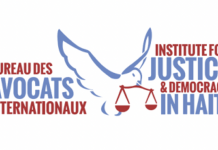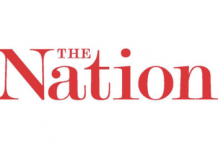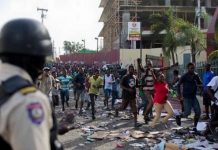By: Joe Emersberger – HaitiAnalysis
The way Human Rights Watch (HRW) reported on Haiti and Venezuela in its 2008 World Report reveals an underlying assumption that the US and its allies have the right to overthrow democratic governments.[1]
It is a matter of public record that the US funded groups who were involved in the coup of 2002 and continued to do so after the coup took place, but rather than denounce or even acknowledge US destabilization efforts in Venezuela, HRW continues to complain about the non-renewal of RCTV’s public broadcasting license. [2] RCTV was one of big television networks that aided and abetted the coup. HRW objects that RCTV’s involvement in the coup “was not proven in a proceeding in which RCTV had an opportunity to present a defense.” It is impossible to imagine a non-farcical proceeding that would conclude otherwise, especially when the coup’s perpetrators thanked the private media, of which RCTV was a major part, for its help. Before the coup was reversed Vice-Admiral Ramirez Perez told a Venezuelan reporter:
“We had a deadly weapon: the media. And now that I have the opportunity, let me congratulate you.”
Judging by its reports, HRW is completely uninterested in whether the broadcaster that replaced RCTV on the public airwaves, TVes, offers viewers a wider variety of views. [3]”Freedom of the Press Barons” to perpetrate coups appears to be HRW’s concern, not freedom of expression. It is worth remembering that HRW’s response to the coup in Venezuela was appalling. Al Giordano summed their response up well in an exchange with an HRW intern:
“They recognized an illegitimate ‘authority’ as legitimate. They failed to call for the removal of that dictatorial regime. They failed to call on other nations and the OAS to refuse to recognize it. They failed to call for invoking the OAS Democratic Charter for the one event it was intended to prevent.”[4]
Giordano’s words could also be used to summarize how HRW responded to the US backed coup in Haiti in 2004.
HRW used the 2008 World Report to criticize, yet again, a judicial reform law that was passed by the Chavez administration in 2004. In contrast, HRW’s summary about Haiti said nothing about the coup that ousted Jean Bertrand Aristide’s democratic government in 2004; nothing about the subsequent murder of thousands of people who supported Aristide’s Lavalas movement (the word “Lavalas” does not even appear in the summary); nothing about the fact that Haiti’s police and judiciary remain stacked with appointees from the dictatorship of 2004-2006; nothing about Father Gerard Jean Juste, the most prominent political prisoner of that period, who continues to be hounded by Haiti’s legal system. [5]
Even if HRW’s criticism of Venezuela’s judicial reform law of 2004 were reasonable (and it isn’t) it cannot deserve more attention than the coup in Haiti that led to a human rights catastrophe. [6]
On a positive note, the 2008 World Report belatedly gave some attention to the disappearance of Lovinsky Pierre Antoine, a prominent Haitian human rights worker and opponent of the 2004 coup. HRW stated:
“In August 2007 a well known human rights advocate, Lovinsky Pierre-Antoine, was abducted. At this writing his whereabouts remain unknown.”
Again, the absence of the word “Lavalas” is telling. Pierre-Antoine disappeared days after he had announced that he would run for the Haitian senate as a Fanmi Lavalas Party candidate. The goal of the 2004 coup and the bloodbath that followed was to eliminate the Lavalas movement – the same goal with basically the same perpetrators as during the 1991-1994 period about which HRW reported extensively. [7]
At first glance, the 2008 World Report seems to provide courageous and much needed criticism of powerful countries like the US. HRW is willing to contradict the Bush Administration on some important matters. For example, in a press conference about the 2008 World Report, HRW director Ken Roth refused to label Venezuela as a “closed country”. However, Roth went on to say that human rights “trends were negative in Venezuela”. That conclusion is justified only if one assumes that perpetrating coups and other acts of sabotage against a democratic government should have no legal repercussions at all. Meanwhile, in Haiti, when human rights trends really were disastrously negative thanks to a coup backed by the US and its allies, HRW displayed a chilling indifference.[8]
An important lesson to learn from the coups that took place in Haiti and Venezuela is that US imperialism cannot succeed through the efforts of Neocons alone. It needs the help of other countries, and it needs the help of NGOs like Human Rights Watch. [9]
NOTES
[1] See Human Rights Watch. World Report. 2008. hrw.org/wr2k8/pdfs/wr2k8_web.pdf
[2] See Eva Gollinger’s “The Chavez Code” for details on US funding of groups that participated in the coup.
[3] There is good reason to believe that freedom of expression on the public airwaves has been improved by replacing RCTV with TVES James Jordan notes “The new broadcasting license is being given to a public station, TVes-Venezuela Social Television, which will run shows produced mainly by independent parties. The station will be controlled not by the government, but by a foundation of community members, with one chair reserved for a government representative. ” http://www.venezuelanalysis.com/analysis/2416 For more specifics about RCTV’s involvement in the coup see
http://www.globalexchange.org/countries
/americas/venezuela/2974.html
[4] Al Giodano’s exchange with the HRW intern can be read at http://narcosphere.narconews.com/
story/2004/6/17/15422/6410
[5] for more about the coup and Haiti and its consequences see Kolbe and Hudson. Lancet Study. 2006, http://www.ijdh.org/pdf/Lancet%20Article%208-06.pdf http://www.haitianalysis.com/2007/7/31/
interview-with-athena-kolbe-co-author-of-lancet-study-on-haiti
[6] The judicial reform law broke the stranglehold of Venezuelan elite on the judiciary. For extensive discussion of the reform law and HRW’s objections see note 3
[7]For more discussion of how HRW responded to the 1991 and 2004 coups in Haiti see http://www.zmag.org/content/
showarticle.cfm?ItemID=10011
[8] See Http://www.miamiherald.com/news
/breaking_dade/story/401747.html
[9] The priorities displayed in HRW reports are well aligned with those of liberal imperialists like Lloyd Axworthy, a former Canadian External Affairs Minister who sits on HRW’s board. See http://www.hrw.org/about/info/board.html For more about Axworthy’s liberal imperialism see http://www.killingtrain.com/node/397





